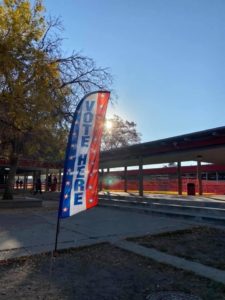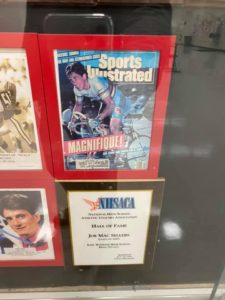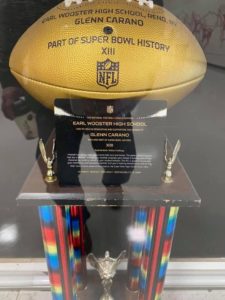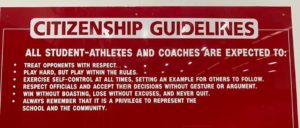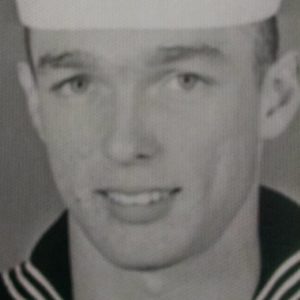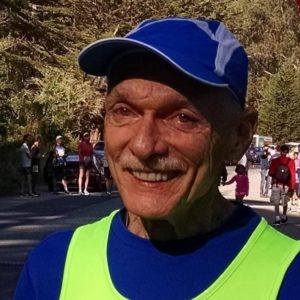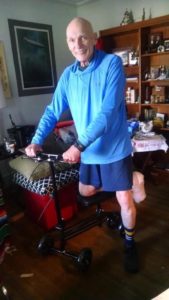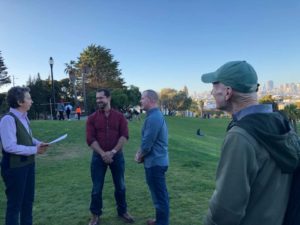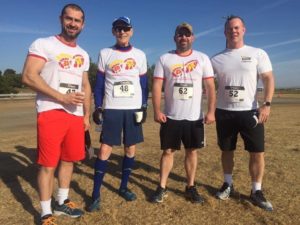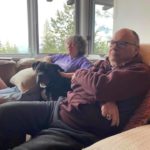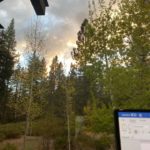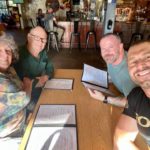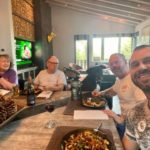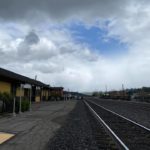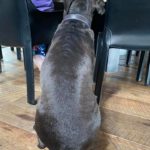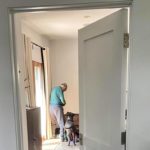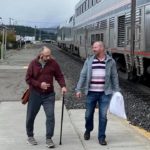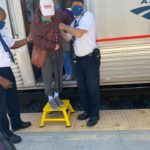October 2022
Tony and I met our son Benji two weeks ago, primarily because that’s when he was born. The blurry images of him squirming around on video monitors don’t really count. My overall impression based on all the stereotypes we had heard is that Benji is doing “baby” really well. He certainly has “helpless” down to a science. So far, he hasn’t lifted a finger to help out around the house. He sleeps whenever it’s convenient for him. Worse, he seems to think this is a 24-hour restaurant where he can place an order anytime—oh, and not take out … delivery! He’s also perfected this cooing noise that he makes while he finishes his bottle at the same pace a tree grows. The cooing is a nice touch, but it reeks of manipulation.
During Benji’s naps, “Friday Night Lights” has been playing on our TV—a 20-year-old network series that has not lost any of its potency. It’s about a small Texas town obsessed with its high school football team. A tragedy in the first episode sets the stage for an often gut-wrenching exploration of the complexity of relationships and emotions. As the editor of my high school yearbook and a member of the debate and forensics team, I never thought I’d be gripped by the drama in a football locker room. In the latest episode that Benji deigned to let us watch, the coach had benched the two star players for in-fighting and as a result the team was losing badly at the half. The locker room was tense and the coach was furious—furious with a purpose. He kept yelling, “Who’s got something to say? Who’s got something to say?” One player talked about bringing the star players back and the coach yelled, “Sit down!” “Now, who’s got something to say?” After a few moments, the newest member of the team spoke in his characteristically soft voice, “Maybe the whole is greater than the sum of its parts.” Coach told him to speak up, “What did you say?” He stood up nervously—“Maybe we are forgetting we are a lot stronger together than we are ever going to be alone.” That was the sentiment the coach wanted to hear, and the team was inspired by the newest and quietest voice in the room. The coach held his gaze on the new player and then yelled out the team motto, the players echoing it back: “Cleary Eyes, Full Heart!”
Benji, on the other hand, hasn’t uttered a word. But witnessing the power he already has to bring joy into the world has been a reminder of how much better we can be. When he was just 24 hours old, we took Benji to Starbucks—as one does—for a caffeine jolt before the three-hour drive home. It was an empty Starbucks in a small town with just two employees. One came running from behind the counter to see Benji in his little portable car seat. She smiled and waved at him and said he was a gift from God. I thought that might come as news to the scientists, doctors, surrogate, and egg donor who made Benji possible, but I was too intrigued by her excitement to make a meaningless point. As we left, she was telling her colleague, “just one day old, just one day old, can you believe that?”
Benji has had us on video calls with friends and loved ones. Friends have visited the house to meet Benji. After discussing whether or not he’s cute and how good of a sleeper he is, you’ve pretty much exhausted the baby topics, so we found ourselves learning more about what’s going on in other people’s lives. On a walk to the park we rounded a corner to find a family with the exact same obscure brand of stroller, and we ended up in a pleasant conversation with neighbors who have a newborn just a few days older than Benji. Just yesterday our neighbor brought a gift and we met her high school-aged daughter who promised to give “some thought” to her hourly babysitting rate. I saw her eyeing the room to assess our budget. “Is that print signed and numbered,” she asked in my imagination.
A friend of ours told me a couple months ago that it took some time for him to fall in love with his first child, and in fact for a couple months he resented him for changing their lives—an honest admission and a reminder that love is not automatic. During Benji’s creation, which lasted far longer than the nine months he spent in the womb (doing essentially what he’s doing now, i.e., practically nothing), I didn’t feel it. It felt like an exercise in planning. In the delivery room emotion took over, but that was my awe at the experience—the strength and kindness of our surrogate, the doctor’s readiness and skill, the team of assistants—just the vastness of what was happening in that room. The silence followed by Benji’s first cry and breath of life is something I’ll hold onto forever, but I still felt disconnected, like Benji was just this fragile thing and it was my job to keep him alive.
A week later Benji and I had some alone time while Tony was at the gym. We were on the couch, our dog Harvey stretched out on the other side. The TV was muted and the room was quiet. I thought Benji was asleep so I put him on my legs with his head sitting between my propped up knees and reached for my phone. When I looked back, Benji had opened his eyes, wide, and he was looking directly into mine for the first time. We did that for a few minutes. I don’t know what a one-week-old baby can actually see, but I know in those moments his vision quickly became less blurry than mine. We just looked at each other and I thought about a question I had been asked many times and never answered because there was no rational answer . . . “Are you ready for this?” The answer still doesn’t matter. All I could do was tell Benji the truth, which is that I love him and I always will. Harvey then fucked up the entire scene by barking at some noise at the front door.
When the players returned to the field after the half, the star players reached a truce and the coach put them back in the game. The quarterback, however, called an unexpected play—a pass to the new guy. Why? Because his heart was in the game. He missed the catch, but he kept fighting. On the verge of defeat, he sprinted and hit the other side’s running back hard, resulting in a fumble and ultimately a win for the team. In the chaotic celebration of an unlikely victory, the coach jogged up to the new player and put his arm around him and said in his ear, “Welcome to the team.”
As team members, as a family, we are learning that there will be lots of missed catches and, with persistence, just as many successes. Falling in love and being ready for the complications love brings don’t necessarily align.
Benji heard his first song in that empty Starbucks. It was Joni Mitchell’s “Big Yellow Taxi.” I think the Counting Crows were singing it. It’s one of those musical poems that can be about anything you want. Mitchell was moved by seeing Hawaii paved over with parking lots. But she writes more generally about her personal regrets over what could have been, the emptiness of failing to fight for whatever it is you find beautiful in your life.
